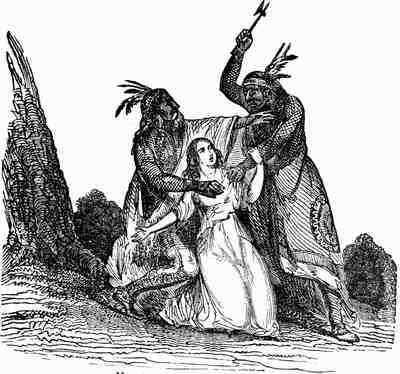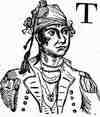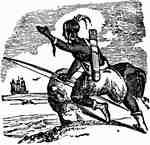Thrilling Incidents In American History
• Preface
Revolutionary War
• Opening Of The Revolution
• The Boston Massacre
• Affair of the Sloop Liberty
• Affair of the Gaspee
• The Tea Riot
• The Boston Port Bill
• The First Continental Congress-Consequent Parliamentary proceedings
• Organization of the Minute-Men
• Patrick Henry-Second Provincial Congress-First Military Enterprise
• Battles of Lexington and Concord
• Battle of Bunker's Hill
• Capture of Ticonderoga
• Second Continental Congress-Washington's Appointment
• Siege of Boston
• Incidents at the Evacuation of Boston
• Burning of Falmouth
• Arnold's Expedition to Quebec
• Siege of Quebec, and Death of Montgomery
• Scenes at Quebec during the Siege
• Expedition against Charleston
• The Declaration of Independence
• The Battle of Long Island
• Washington's Retreat through New Jersey-Capture of General Lee
• Battle of Trenton
• Battle of Princeton
• Capture of General Prescott
• Battle of Brandywine
• Battle of Germantown
• Battle of Red-Bank
• Attack on Fort Mifflin-Retirement of the Army to Valley Forge
• Battle of Bennington
• Murder of Miss M'Crea
• Battle of Stillwater
• Battle of Bemis' Heights, and Retreat of Burgoyne
• Capture of Forts Clinton and Montgomery
• Surrender of Burgoyne
• The Treaty with France
• Attack on Savannah, and Death of Pulaski
• Storming of Stony Point
• General Sullivan's Campaign against the Mohawks
• Tarleton's Quarters
• Battle of Camden, and Death of De Kalb
• Arnold's Treason
• The Loss of the Randolph
• The British Prison-Ships
• Capture of the Serapis
• Putnam's Feat at Horseneck
• Battle of Eutaw Springs
• Wayne's Charge at Green Spring
• Capture of the General Monk
• The Mutinies
• Battle of the Cowpens
• Capture of New London
• Massacre of Wyoming
• Surrender of Cornwallis
War With France
• Capture of L'Insurgente
• The Constellation and Vengeance
War With Tripoli
• Burning of the Philadelphia
• Bombardment of Tripoli
• Loss of the Intrepid
• Expedition of General Eaton
Second War With England
• Battle of Tippecanoe
• Capture of the Guerriere
• Tragical Affair of an Indian Chief
• Battle and Massacre at the River Raisin
• Captain Holmes's Expedition
• Capture of the Caledonia and Detroit
• The Wasp and Frolic
• Gallant Conduct of Lieutenant Allen at the Capture of the Macedonian
• Capture and Destruction of the Java
• Siege of Fort Meigs
• Capture of York, and Death of General Pike
• Defence of Sackett's Harbour
• Defence of Fort Stephenson
• Battle of Lake Erie
• Battle of the Thames
• Gallant Action of Commodore Chauncey under the guns of Kingston Citadel
• The Sacking of Hampton
• Capture of the Peacock
• Massacre at Fort Mimms
• Surrender of Weatherford
• Battle of Niagara
• BattIe of New Orleans
War With Mexico
• Battle of Palo Alto
• Battle of Resaca de la Palma
• Capture of Monterey
• Battle in the Streets of Monterey
• Thrilling Scenes in the Battle of Buena Vista
• Bombardment of Vera Cruz
• Battle of Cerro Gordo
• Battles of Contreras and Churubusco
• Storming of Chapultepec


Murder of Miss M'Crea
MURDER OF MISS M'CREA.
 HIS thrillng event has been
variously related by various authorities.
The following account,
from Dr. Thacher's Military
Journal, has the advantage
of coming from an intelligent
person who was near the scene
of action at the time.
General Gates has issued a proclamation to
counteract any influence which Burgoyne's sanguinary
manifesto might have produced, interdicting all
communication with the royal army, and endeavouring
to calm the fears of the inhabitants, by promising
them all the protection in his power. Burgoyne's
manifesto, however, denouncing fire and sword, instead
of alarming into submission, excites universal
indignation and contempt; instead of conciliating,
and increasing the number of his friends, serves only
to exasperate and augment our means of resistance
and opposition to his views. It was not long, indeed,
before some innocent persons were made victims of
savage barbarity, by means of the tomahawk and
scalping-knife, in the hands of the barbarians under
his command. Among the first of these victims was
Miss Jenny M'Crea, who was murdered in a manner
extremely shocking to the feelings of humanity. The
father of Miss M'Crea was friendly towards the
royalists, and the young lady was engaged to marry
a refugee officer in Burgoyne's army, by the name of
Jones, and awaited his arrival in order to have the
marriage consummated. When our army retreated
from Fort Edward, Miss M'Crea had the indiscretion
to remain behind, probably with the expectation of
meeting her lover. The Indians, however, soon made
her their prisoner; and on their return towards Burgoyne's
camp, a quarrel arose to decide who should
hold possession of the fair prize. During the controversy,
one of the monsters struck his tomahawk
into her skull, and immediately stripped off her scalp.
HIS thrillng event has been
variously related by various authorities.
The following account,
from Dr. Thacher's Military
Journal, has the advantage
of coming from an intelligent
person who was near the scene
of action at the time.
General Gates has issued a proclamation to
counteract any influence which Burgoyne's sanguinary
manifesto might have produced, interdicting all
communication with the royal army, and endeavouring
to calm the fears of the inhabitants, by promising
them all the protection in his power. Burgoyne's
manifesto, however, denouncing fire and sword, instead
of alarming into submission, excites universal
indignation and contempt; instead of conciliating,
and increasing the number of his friends, serves only
to exasperate and augment our means of resistance
and opposition to his views. It was not long, indeed,
before some innocent persons were made victims of
savage barbarity, by means of the tomahawk and
scalping-knife, in the hands of the barbarians under
his command. Among the first of these victims was
Miss Jenny M'Crea, who was murdered in a manner
extremely shocking to the feelings of humanity. The
father of Miss M'Crea was friendly towards the
royalists, and the young lady was engaged to marry
a refugee officer in Burgoyne's army, by the name of
Jones, and awaited his arrival in order to have the
marriage consummated. When our army retreated
from Fort Edward, Miss M'Crea had the indiscretion
to remain behind, probably with the expectation of
meeting her lover. The Indians, however, soon made
her their prisoner; and on their return towards Burgoyne's
camp, a quarrel arose to decide who should
hold possession of the fair prize. During the controversy,
one of the monsters struck his tomahawk
into her skull, and immediately stripped off her scalp.
General Gates complains to General Burgoyne of this and other outrages in the following words:- "A young lady, Miss M'Crea, lovely to the sight, of virtuous character and amiable disposition, engaged to be married to an officer in your army, was, with other women and children, taken out of a house near Fort Edward, carried into the woods, and there scalped and mangled in the most shocking manner. Two parents, with their six children, were all treated with the same inhumanity, while quietly residing in their own happy and peaceful dwellings. The miserable fate of Miss M'Crea was peculiarly aggravated by her being dressed to receive her promised husband-but met her murderer, employed by you. Upwards of one hundred men, women, and children, have perished by the hands of ruffians, to whom it is asserted you have paid the price of blood." This appears since to be rather an exaggerated charge. In General Burgoyne's reply, he says :-"The fact was no premeditated barbarity; on the contrary, two chiefs who had brought Miss M'Crea off, for the purpose of security, not of violence to her person, disputed which should be her guard, and in a fit of savage passion in the one from whose hands she was snatched, the unhappy woman became the victim." He expresses sorrow and regret for the tragic scenes, and further states that he obliged the Indians to give up the murderer into his hands, and he certainly should have suffered an ignominious death, had he not been convinced that a pardon on his terms would be more efficacious than an execution, to prevent further mischief. That he paid for scalps he denies; but the Indians were to receive compensation for prisoners. This cruel conduct of the royalists is contemplated with horror and detestation by all ranks of people, except their friends and adherents. It is impossible not to detest that cause and that army which accepts the aid of savage auxiliaries, and encourages them in inhuman slaughter and bloodshed. This measure was certainly countenanced and recommended by the king and his ministers, and General Burgoyne acknowledges that he allowed the Indians to take the scalps of the dead. It must be painful for the impartial historian to record, and it will require the strongest faith of the reader in future ages to credit, the disgraceful story, that Britons, who pride themselves on their civility and humanity, employed the wild savages of the wilderness in a war against a people united to them by the ties of consanguinity; that age, and the helpless invalid, women, and children at the breast, are all alike subjected to the merciless fury of barbarians; that British generals should be so regardless of the dignity of their station, and the voice of humanity, as to receive from the hands of these ferocious wretches the scalps torn from the skulls of innocent persons!
